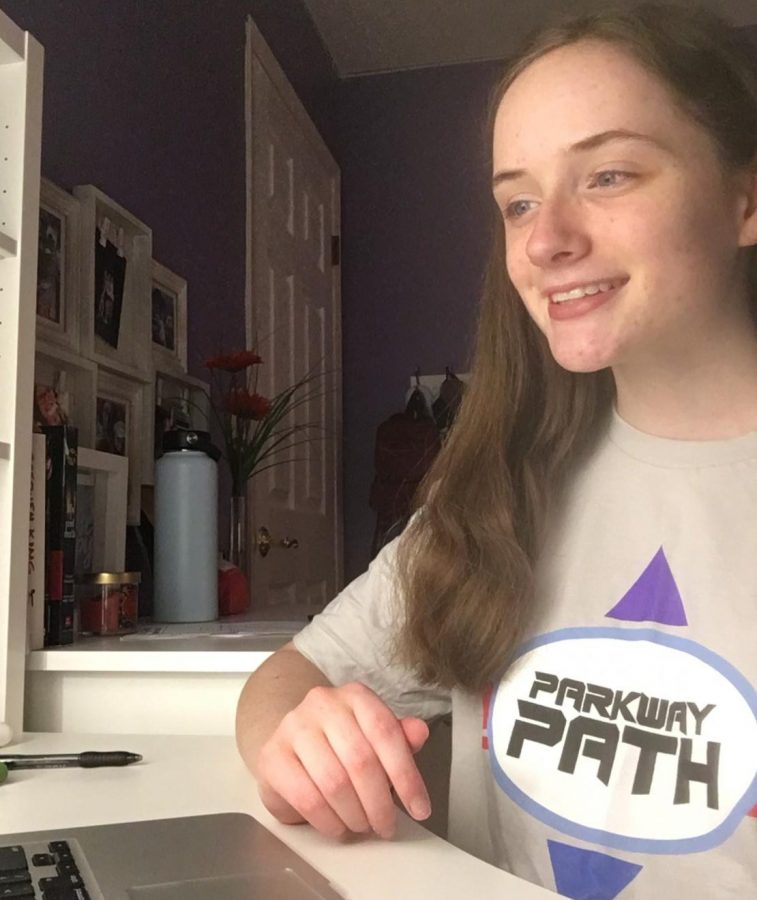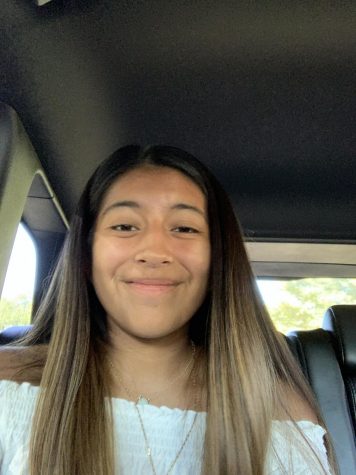After her father passed away from lung cancer, sponsor and Physical Education teacher Tommie Rowe knew she needed to honor his memory by educating teens at a younger age about drug prevention.
“My father died of lung cancer from smoking [at] a very young age. He wasn’t taught about how bad these things are for you, so in my heart, I feel like the more knowledge, the better,” Rowe said.
Rowe quickly got involved in the Parkway High School Heroes program as a sponsor.
“It’s a very strong program that these kids at a younger age need to know,” Rowe said.
Fast forward 25 years and Rowe never anticipated having to find a new way to connect and teach middle school students about being drug-free. She and her team of High School Heroes have worked to create a COVID-19 safe lesson via videos about the harmful effect that smoking marijuana, e-cigarettes and regular cigarettes have on the body.
“We’ve given the high school kids more of a leadership role. They make videos of them teaching the lesson, they [will] send it to the teachers and they play the videos for the kids,” Rowe said.
Sophomore Sammi Duncan, a first-year High School Hero, was interested in the High School Heroes program after she saw her sixth-grade camp counselor, alumnus Ashlyn Roesch, as a Hero in her health class.
“I wanted to be a positive role model for the younger kids to show them that you don’t need drugs; you can be healthy and still have fun. [I want to] encourage kids to live drug-free lives,” Duncan said.
Although the sessions are virtual, participants think their message will still get across and be impactful for the younger students. She recalls when the High School Heroes brought in a black lung to show kids the effects of smoking. She is aware that they will not be able to do activities like that, but she is committed to making her video count.
“It’s definitely more fun to have the high schoolers there and in person. The middle schoolers are used to Zoom classes now, so it won’t be out of the ordinary for what’s happening now,” Duncan said. “We are going to try to make it fun and entertaining and keep them engaged, but I think part of it’s lost when it’s not done in person.”
Rowe hopes that these videos will be beneficial in the long run and wants the videos to keep the same format but in a virtual setting. She is optimistic that kids will be receptive to the sessions and they will be able to absorb the information given to them about being safe and drug-free.
“Is it going to be different? Yes. The good thing about it is [that] it may be accessible to them after this. They can go home to mom and dad and say, ‘Hey I saw this cool video of these kids at West.’ That might be something, I don’t know if they are doing that yet or not, I’m hoping they do,” Rowe said.
Duncan believes that having student leaders deliver the content builds a deeper connection with the high schoolers than they would with teachers or adults.
“[Students] get sick of hearing adults. They’ve heard about putting off drugs all through school and programs. It falls on deaf ears when I say it, but when [students] say it, they’re going to be like ‘oh, I know her because of my sister or this friend,’ and I like that,” Rowe said.
According to the High School Heroes website, the secret to the program’s success is the high school students delivering the message.
“If we reach five to six kids then we’re doing a good job because that’s five or six kids that will be drug-free.”



![Smiling in a sea of Longhorns, Fox 2 reporter Ty Hawkins joins junior Darren Young during the morning Oct. 3 pep rally. The last time West was featured in this segment was 2011. “[I hope people see this and think] if you come to [Parkway] West, you will have the time of your life because there are so many fun activities to do that make it feel like you belong here. I was surprised so many people attended, but it was a lot of fun,” Young said.](https://pwestpathfinder.com/wp-content/uploads/2025/10/Edited2-1200x798.jpg)
![West High seniors and families listen as a representative of The Scholarship Foundation of St. Louis, Teresa Steinkamp, leads a Free Application for Federal Student Aid (FAFSA) workshop. This session, held in the library, provided guidance on financial aid, scholarships and student loan options. “This event is very beneficial for any seniors who are applying to or considering applying to colleges after high school [because] the cost of college is on the rise for seniors and parents,” college and career counselor Chris Lorenz said.](https://pwestpathfinder.com/wp-content/uploads/2025/09/DSC_4478-1200x778.jpg)
![Senior Kamori Berry walks across the field during halftime at the Homecoming football game on Sept. 12. During the pep assembly earlier that day, she was pronounced Homecoming Queen. “I thought it was nice that the crowd [started] cheering right away. I know [my friends] were really excited for me, and my family was happy because typically non-white people don't win,” Berry said.](https://pwestpathfinder.com/wp-content/uploads/2025/09/DSC7046-Enhanced-NR-1200x798.jpg)



![Pitching the ball on Apr. 14, senior Henry Wild and his team play against Belleville East. Wild was named scholar athlete of the year by St. Louis Post-Dispatch after maintaining a high cumulative GPA and staying involved with athletics for all of high school. “It’s an amazing honor. I feel very blessed to have the opportunity to represent my school [and] what [it] stands for,” Wild said.](https://pwestpathfinder.com/wp-content/uploads/2025/05/unnamed-6-1200x714.jpg)
![The Glory of Missouri award recipients stand with their certificates after finding out which virtue they were chosen to represent. When discovering their virtues, some recipients were met with contented confirmation, while others, complete surprise. “I was not at all surprised to get Truth. I discussed that with some of the other people who were getting the awards as well, and that came up as something I might get. Being in journalism, [Fellowship of Christian Athletes and] Speech and Debate, there's a culture of really caring about truth as a principle that I've tried to contribute to as well. I was very glad; [Truth] was a great one to get,” senior Will Gonsior said.](https://pwestpathfinder.com/wp-content/uploads/2025/04/Group-Glory-of-Missouri.jpg)


